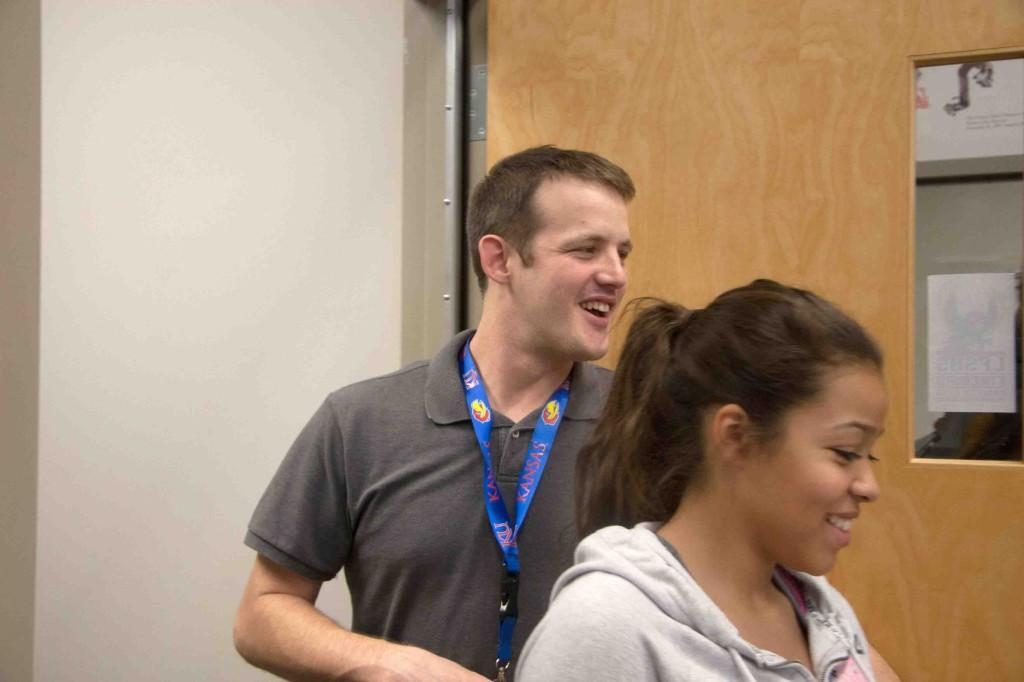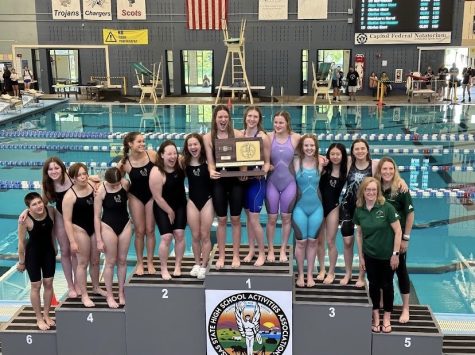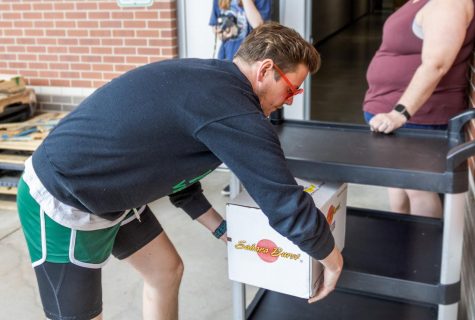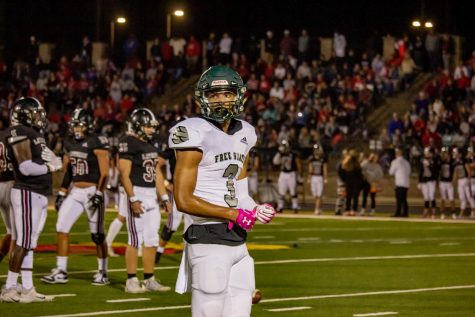Free State hires new debate coach after coach’s midyear departure
New debate coach Jason Moore smiles as he holds open the door for junior Lexci Kimball. He was hired three weeks into the season after the departure of Patty Newkirk.
Compiling the time he devotes in class, after school and as an aide, junior Parker Hopkins estimates that he is in Room 151, the debate room, about 323 hours a semester, finding evidence, polishing speaking techniques, helping first year “novice” debaters and forming friendships.
Before this summer, Hopkins knew that he and the other third year debaters would move into leadership positions on the debate squad during the 2013 season, but he did not yet realize the full extent of his new responsibilities.
On June 24, the debate squad received an unexpected email from the teacher in whose room Hopkins had spent the majority of his high school career. The email said that Jo Ball, his debate coach and friend, was leaving Free State to pursue her dream of working with her mentor in Olathe.
“I was a little freaked out about what was going to happen, and then I called Ms. Ball,” Hopkins said. “… I did not cry, but I did call Ms. Ball.”
During their phone conversation, Ball told Hopkins that she was sorry to leave the squad in such disarray, but she felt that the transition to Olathe would be the best move for herself.
Later that summer, Hopkins pulled his truck up to the Free State loading dock and helped Ball move her belongings out of her office. They spent their last few moments in the debate room reminiscing, and Hopkins reluctantly admitted that they both shed a few tears.
“[I] talked to my debate coach, … [who] has been a big part of my life for the last two years,” Hopkins said. “I don’t know. It was fun I guess.”
After he helped move Ball out, Hopkins got to work moving the new debate coach Patty Newkirk in and teaching her how Free State debate operated. Because Newkirk had not coached her own squad for 10 years, Hopkins helped her brush up on some of debate’s new lingo.
“Debate change[d] in the last 10 years,” Hopkins said. “There’s things that weren’t in debate 10 years ago that now exist, or that weren’t prevalent then, but now are, or things that are prevalent now that weren’t then.”
Only two weeks into the school year, just as Newkirk was transitioning to the new aspects of debate, she had to resign because an unspecified health issue kept her from transporting students to tournaments, sending the administration into a frantic search for a new coach. They found Jason Moore, a substitute teacher in Olathe with a bachelor’s degree in broadcast journalism and a master’s in education.
Moore took four years of forensics in high school; however, he is a “novice” in debate. Newkirk met with Moore briefly before her departure to give him resources, tell him what the squad had done so far and offer her future help if he found that he needed it. In addition, another assistant coach was hired to help Moore take over the squad.
“I feel like it’s going really well,” Moore said. “I’ve had a lot of support from the administration and my assistant coaches, and I just really feel like I’m set up for success … I feel like, in many ways, learning as I go is a good thing, in the sense that it gives me an interesting perspective on how to present the material and how to assess the novices’ progression.”
Assistant coaches Nate Peabody and Michael Shelton teach the debaters what Moore isn’t yet able to teach. They judge practice rounds, go to tournaments, work with advanced students on work nights and help Moore present material during class.
When Ball asked Shelton to judge the state debate tournament last year, he had already committed to judging a different tournament, so he recommended his roommate, Peabody. Through this interaction, Peabody eventually became Ball’s forensics assistant coach, and he remained with the squad after the resignations of Ball and Newkirk. When Free State needed another coach, Peabody recommended Shelton.’
“Nate … is the one who came to me and said, ‘Hey, there’s an opening for an assistant. You recommended me and got me the assistant job, so how about I recommend you and get you the other assistant job,’” Shelton said.
As a high school student, Shelton was one of the top 25 debaters in the National Forensics League, comprised of about 80,000-90,000 students from all over the country. Unable to commit to the level required for the highest level of college debate, Shelton decided to instead focus on his studies, graduating at the end of the 2013 summer term with a master’s degree in International Relations. He never really left the activity, however, judging tournaments on the weekends for his old competitors, who now coach their own squads. Experience coupled with his roommate’s recommendation got him the job.
“I like working on debate, and we would be sitting at home talking about debate, Nate and I, anyway so to get to come in and be hands-on is fun for me just because I enjoy doing it,” Shelton said.
While the debate program finally settles into a rhythm, some debaters still feel lost and confused in the wake of the rocky transition.
“I probably won’t do it next year,” said junior Ashley Dunn, second year debater. “I think what kept me in it last year, in both debate and forensics, was Ms. Ball. Like she was such great teacher,and she invested so much time in like every one of her students, … wanting to help you not necessarily succeed but improve. And now that that’s gone, I’m like why? Like I’m not even that good at it. Like why am I still here? But we’ll see.”
Even though the introduction of new coaches has been difficult for the entire squad, Hopkins hopes that he can recreate the successful experience he had during his first year of debate for at least some of this year’s novice and convince a few of them to stick around.
“The reason I put so much work into it at this point is because debate has been so good to me,” Hopkins said. “… Because of the coaching change thing this year, … the novice don’t necessarily get to have that experience that I was able to have.”
From evenings devoted to cutting theory files, novice case extensions, topicality and impact defense to weekends spent advocating or negating cases about Cuban embargo, Venezuelan oil and Mexican drug trafficking, Hopkins’ debate schedule may not sound like a high schooler’s dream, but he is passionate about it regardless of the change in coaches.
“It’s not a chore,” Hopkins said. “Like, it’s what I love to do. There is responsibility with it, but, I mean, it’s what I love to do.”









![After receiving advice from her students, orchestra director Judy Erpelding marks her music. Although the director normally makes the artistic decisions, Erpelding will often consult her students and hear their opinions on what sounds good and what they should try out. “[The students] are the heart of the program, not me,” Erpelding said. “I know they will carry that on and I will miss them. Making great music with them, being able to challenge them, taking their inspiration.”](https://www.fsfreepressonline.com/wp-content/uploads/2023/05/Roust_Erpelding_5_11_23-317x475.jpg)

